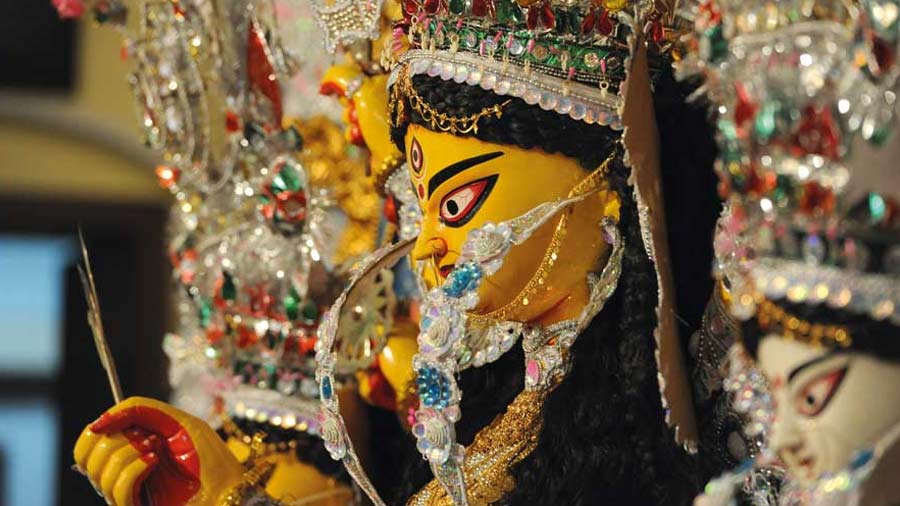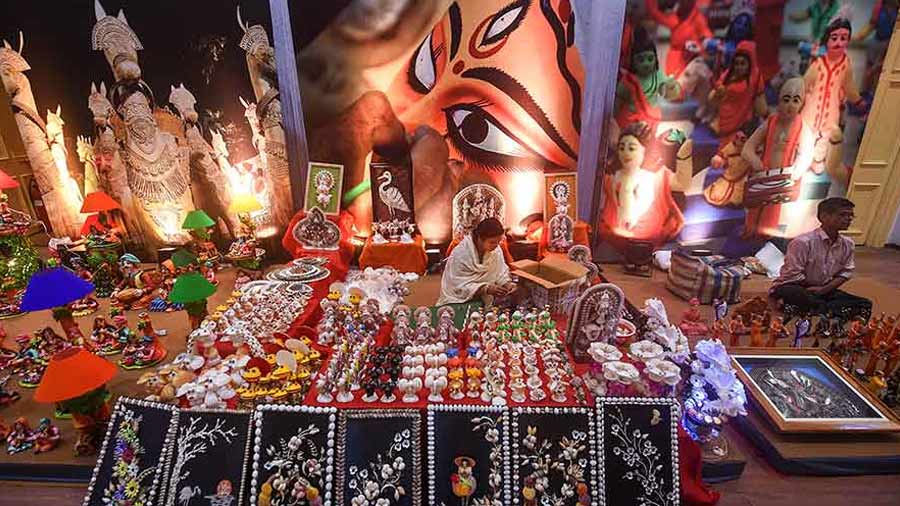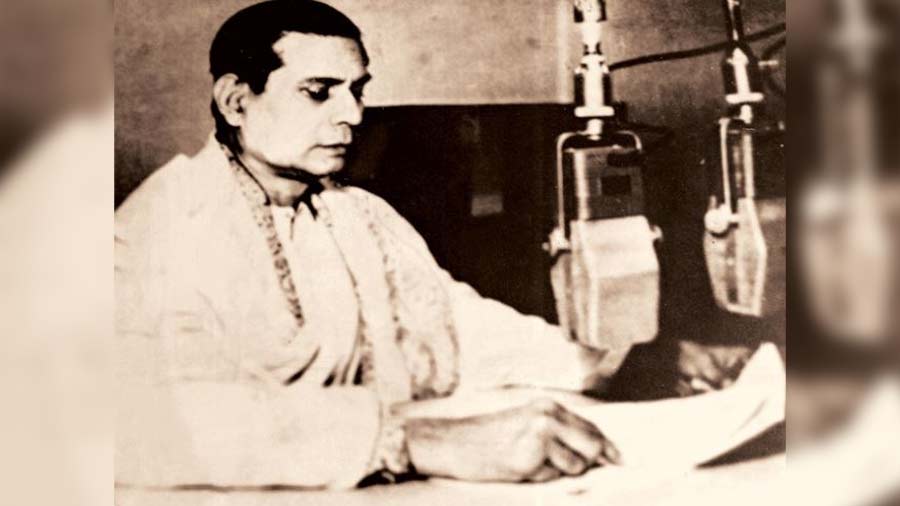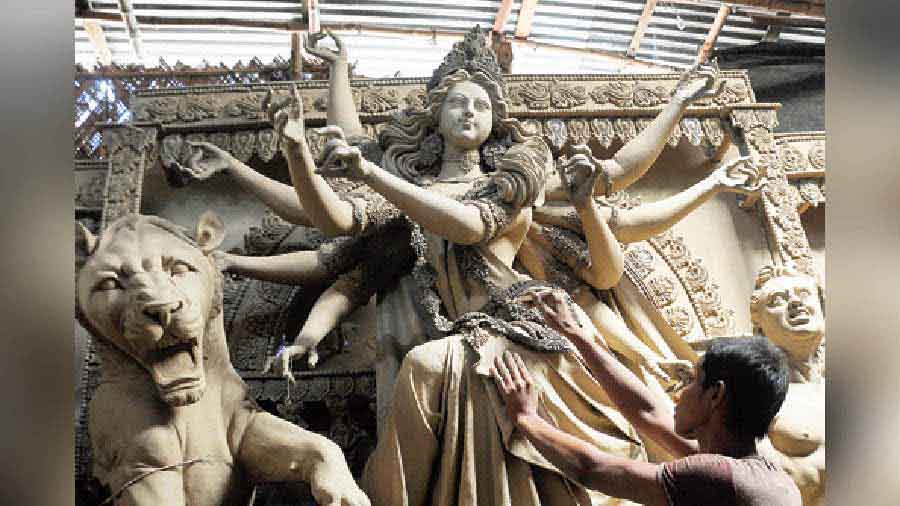Being awake at 4am can feel lonely. When there is no overseas friend to talk to, no riveting show to binge or no football match to keep the adrenaline pumping, it can also feel pointless. Barring that one day on the calendar when Bengalis are more keen on waking up than on going to bed. I mean, of course, the day of Mahalaya (the daybreak, to be precise), the harbinger of Durga Puja and an annual reminder that sonorous is another word for Birendra Krishna Bhadra. For the best part of 25 years, I have quietly observed the frenzy around me to get up at the crack of dawn on Mahalaya and listen to Mahisasuramardini — the story of Ma Durga’s victory over Mahisasura told through slokas and songs. Friends, family, family friends, friends’ families, even acquaintances from other cities and countries, have admitted their excitement to usher in Devi Paksha by tuning the radio or hopping onto YouTube and whiling away 90 minutes, before catching a bit of shut-eye and going about the rest of their day. As for me, a habitual night owl, 4am on Mahalaya has only ever meant one thing: Time to fall fast asleep.
Rebellions and near-misses

Listening to 'Mahisasuramardini' on Mahalaya was something the author had consciously or unconsciously avoided until this year
I vaguely remember my parents snatching a five-year-old me away from an endless castle of chocolates just to plonk a good, old radio in front of my droopy eyes. Once the purpose of the disruption had been made clear, I insisted on staying up the next year and dozing off only after Mahisasura was dead. Denied the permission to do so, I slept through several Mahalayas, moving from disappointment to indifference. Until one year, when the sound of a song, which throbbed like an incantation, wafted in on my way to the washroom. On my way out, I saw my parents listening intently to the radio. The clock had just struck 15 minutes past five in the morning. I wished them good morning (or good night, or both) and quickly returned to dreamland. When I was about nine or 10, my school friends started gushing so much about the prospect of “hearing Mahalaya” (we could not yet remember or pronounce Mahisasuramardini) that I took the rebellious call of having nothing to do with it. With the arrival of teenage and then college, I became a close friend’s alarm clock. “Please call me at 3.50am sharp. You’ll be up anyway, right?”. Every year, before I could call, she would text, saying: “I’m up, thanks.” That would be my cue to call it a night.
When I was in the UK between 2019 and 2020, I felt a pang to change my Mahalaya routine. Being 5,000 miles away from home, tradition was about refuge, not rebellion. The peculiarities of time zones meant I would only have to be up till midnight for Mahisasuramardini to temporarily turn Brighton into north Kolkata (Mahalaya can only ever happen in IST!). And yet, on both occasions, I was denied. In 2019, I somehow managed to slip into sleep by 11pm UK time. A year on, charged with caffeine, I was furious to find that the WiFi was dead. Some 25 minutes later, I myself was half-dead in bed.
Within the first five minutes of hitting play, I was bored
Cut to 2023 and I made up my mind that come hell or deep sleep, I would complete Mahisasuramardini on Mahalaya for the first time in my life. At 25, this felt more like a personal mission than a cultural initiation. After all, I had already consumed parts of Mahisasuramardini at multiple points of Durga Puja, be it at traffic signals, pandals or community centres, where someone had once accidentally switched the audio to Dhaker Taley on Ashtami, unleashing a few seconds of absolute bewilderment! In 2011, with Puja still months away, Mahisasuramardini was resounding through the speakers in my locality, as a tribute to another woman who bestrode Bengal like a colossus. In other words, there were no epiphanies to be had from my Mahalaya exercise this year. But I pushed ahead all the same, thinking that sometimes it is okay to do things purely for their own sake.
Around 3am on October 14, I still had an hour left before proceedings got underway. Tired of running through reels, I decided to read up on Mahisasuramardini’s history. I was pleasantly surprised to learn that the programme was performed live every year until the recital was recorded in 1966. For a span of three decades, narrators and singers would turn up in their ethnic finery and present Mahisasuramardini as a team, with flowers and incense sticks setting the mood in the studio. I also discovered that, in 1976, Uttam Kumar had been roped in to replace Birendra Kishore Bhadra on Mahalaya, but not even the Mahanayak’s star power could dim the demand for Bhadra’s inimitable voice.
With the history lessons complete, I reached out for my parents’ ancient radio just as 4am was on the horizon. To my dismay, the same device that had worked hours earlier gave way. I did not wish to wake my mother up to figure out how to fix it. She had stopped listening to Mahisasuramardini ever since my dad had passed away. The obvious alternative was to go to YouTube, where I chose Mahisasuramardini on the Saregama Bengali channel. Within the first five minutes of hitting play, I was bored.
I sat still, taking in every second, as if I were tiptoeing into a trance

By the time Bimal Bhushan’s ‘Namo Chandi’ took over, the author was hooked
Recalling my powers of patience from the days of soporific lectures in college, I persevered. Soon enough, Dwijen Mukhopadhyay’s Jago Tumi Jago sent my boredom for a toss, as I gradually began to get invested in a story I had known only through its broad strokes. It did not matter that I could not understand what most of the Vedic mantras meant (I had never opted for Sanskrit on Duolingo). It did not matter that my tone deafness could not appreciate the range of the melodies either. I sat still, taking in every second, as if tiptoeing into a trance.
By the time Bimal Bhushan’s Namo Chandi took over, I was hooked. In my head, I had started replaying my favourite Puja memories. My first pandal-hopping with friends, the first kurta I had bought with my own money, the first and last time I had braved the Sreebhumi chaos just to catch a glimpse of… my crush. Just then, my phone buzzed. The WhatsApp group meant for niche football jokes suddenly had a Spotify link. Shortly after, I could make out the rustle of Mahisasuramardini from my Bihari neighbour’s bedroom, the same guy who had not stopped alternating between Chaleya and Zinda Banda for the past month. As I felt a smile stretch across my face, it amazed me to think how Bhadra’s pronunciation and tempo never wavered. Mastering one language with such authority appeared even more impressive than speaking 14 different ones, which Bhadra’s father could.
Before I knew it, Rupang Dehi Jayang Dehi was in full flow. A glance at my computer screen confirmed that Mahisasuramardini was nearing its end. In all this time, I had not gone on Instagram once. The initial temptation of switching to 1.5x had also been happily discarded. Bhadra, after all, was not Amit Varma. Once Mahisasuramardini was over, I retired to bed but stayed awake. Like the first rays of sunlight streaming in through the window, a warm glow filled my heart. Was it worth the wait, I asked myself? Yes, it was. Not in the way it is to visit a city you have evaded for years or meet a loved one who almost became a stranger. Not in the way it will be next week, when I celebrate Durga Puja like it will never come back. But in the way that some things just feel right when you complete them. They may not bring with them any revelations for the present or any redemption for the past. But what they offer is an enduring reassurance, the sense that, just like Durga on earth, you are where you belong.

